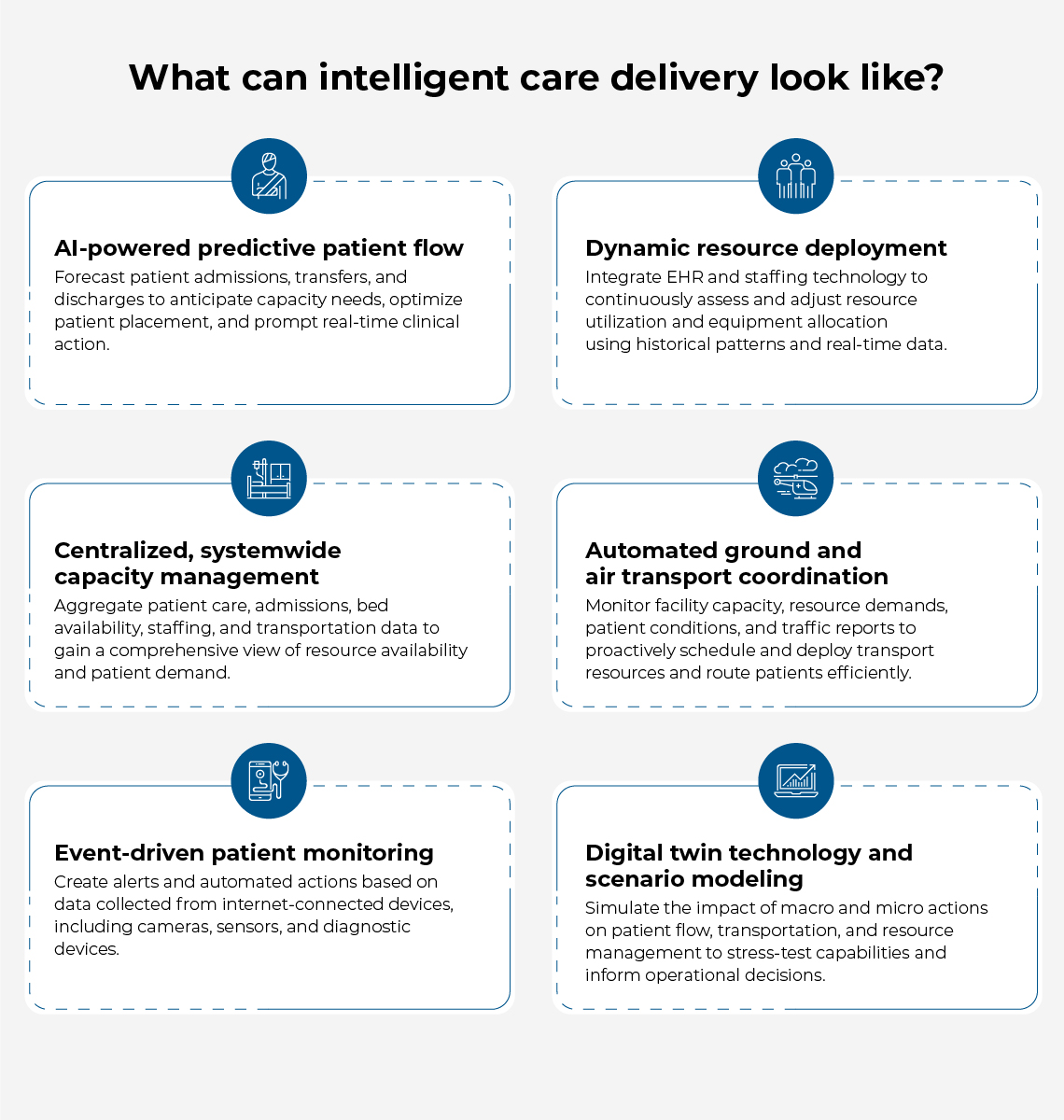In Brief
- Intelligent care models are transforming healthcare by integrating AI, data analytics, and automation to deliver more effective, efficient, and proactive patient care.
- Advanced analytics and AI convert data into predictive insights, enabling care teams to anticipate patient needs and make data-driven decisions that lead to better patient outcomes.
- Intelligent care hubs play a crucial role in centralizing data and technology to provide healthcare teams with the real-time insights to improve clinical decision making and deliver patient-centered care.
The future of healthcare delivery is not just about managing today’s demands but fundamentally reshaping how care is delivered. Rising costs, an aging population, and increasingly complex patient needs emphasize the need for transformation.
Intelligent care delivery models are forging a new path and spurring new possibilities for patient care.
| What is intelligent care? |
|---|
| Intelligent care uses advanced technology and analytics to guide a data-driven approach to delivering care more effectively, efficiently, and with better patient outcomes. |
By integrating automation, data analytics, and artificial intelligence (AI), intelligent care delivery takes healthcare from a reactive, fragmented system to one designed for proactive and personalized care.
Moving from data overload to data-driven healthcare
Healthcare systems are overloaded with data, making it nearly impossible to translate information into actionable insights. Intelligent care delivery bridges that gap, turning data into predictive insights using advanced analytics and AI to anticipate patient needs, detect health risks, and enhance clinical decision making.
For intelligent care to become reality, technology, data, and care teams need to work in harmony. Intelligent care hubs, or command centers, create that foundation, providing the structure for real-time data integration.
| What is an intelligent care hub? |
|---|
| Intelligent care hubs function like a digital nervous system, orchestrating technology systems, AI, and workflows by aggregating and synthesizing data into meaningful insights that prompt real-time human action. |
Ultimately, intelligent care hubs equip care teams and front-line staff with the insights to make data-driven decisions and deliver precise patient care.
Healthcare leaders indicate they recognize the necessity of investing in data structures for better decision making, but it ranks as their top organizational challenge. As healthcare organizations become more data-driven, a sound data strategy and management are crucial to maintain data integrity and ensure seamless exchange across care settings and departments.
Enabling seamless healthcare delivery
With a hub to centralize systems and data sources, intelligent capabilities, such as rapid event-driven data aggregation, can more accurately track how individuals are moving through the system to forecast when and what resources are needed. AI updates continuously, allowing leaders to identify bottlenecks and delays to manage capacity and resources more efficiently and meet the needs of patients and their families.
As workflows are connected and standardized across the care continuum, opportunities to automate manual processes increase to further improve patient flow and deliver timelier patient care.

Intelligent care delivery will look different for each health system as it should reflect the unique needs of the organization and its patient population, but the possible outcomes are consistent:
- Improved patient experience, safety, and quality of care
- Real-time access to patient flow data
- Reduced emergency department boarding, transfer/placement delays, and turnaround times
- Market growth through increased transfer and admission volumes
- Decreased length of stay (LOS)
- Reduced administrative burden and improved staff satisfaction
- Increased transparency and accountability
- Decreased clinical denials
Building the foundation for growth
As more health systems invest in intelligent care delivery, leaders recognize its potential as a strategic growth engine. By enhancing operational and clinical efficiencies, organizations can create a more financially sustainable future and capitalize on growth opportunities that will define modern patient care, such as disease prediction and AI-enhanced population health strategies.
With the rise of AI tools to assist in identifying risk factors, predicting outcomes, and personalizing treatment plans, intelligent care hubs create the foundation for data-driven clinical decision making and enhanced care coordination to deliver more proactive, patient-centered care. Laying this groundwork marks a transformative step toward shifting a system designed to treat sick patients to one incentivized to keep people healthy.

